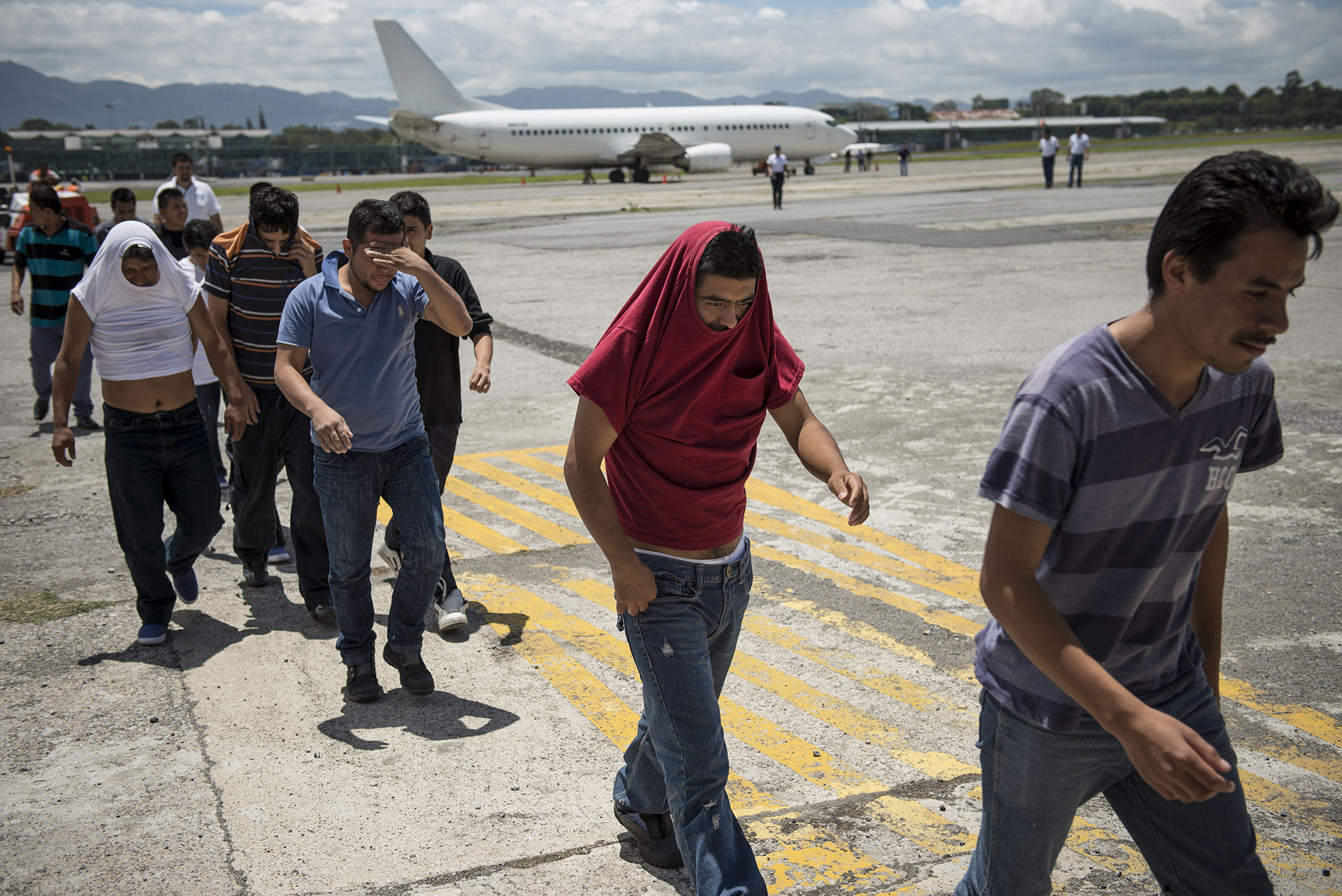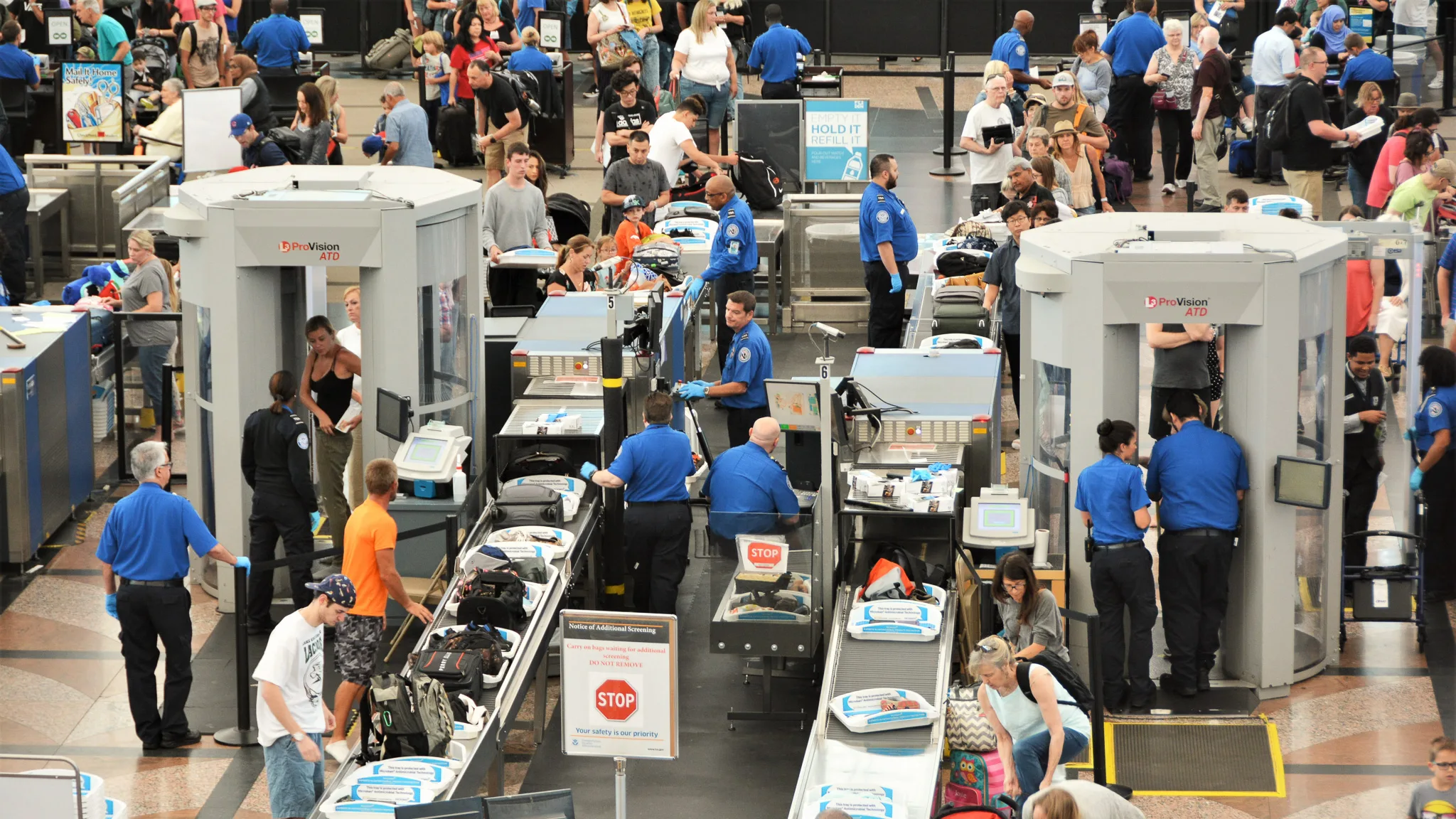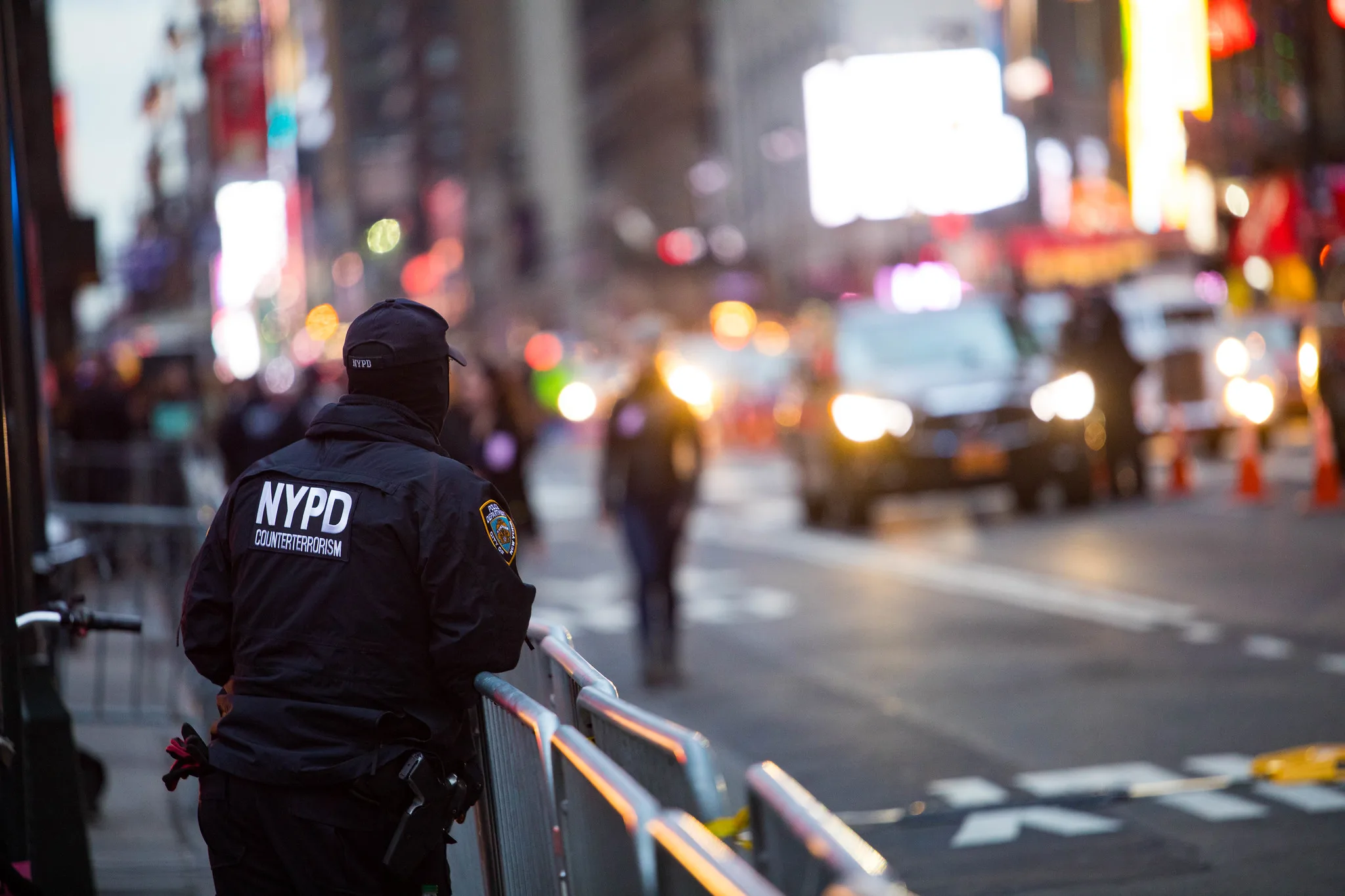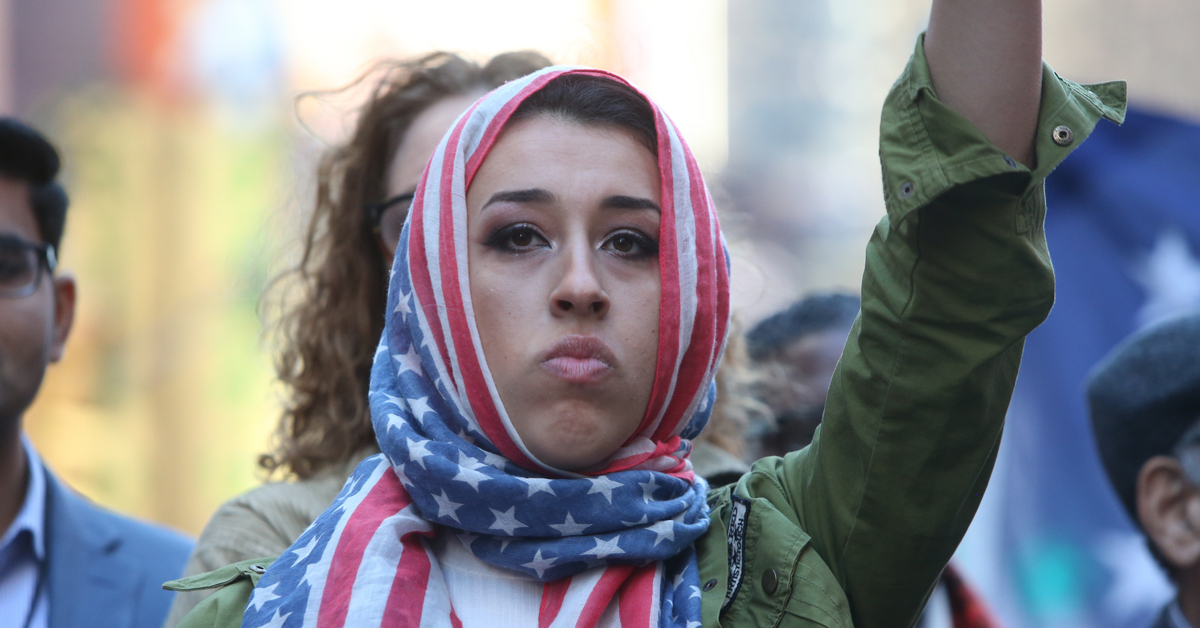A 9-year-old boy from Venezuela lugs his suitcase across a crosswalk under the flashing lights of Times Square’s billboards, running to keep up with his mother. A 2-year-old girl from Gabon pushes along a pink toy shopping cart filled with dolls, following her mother who piles the family’s belongings into grocery bags on a stroller. A three year-old girl from Venezuela sits on rolling luggage as her father pushes her across Midtown’s sidewalks.
At the Row NYC Hotel on Tuesday morning, these families are the first to be evicted from city shelters as part of the Adams administration’s 60-day shelter notice. Some families with children said they weren’t sure where they would sleep on Tuesday evening, and headed to the Roosevelt Hotel to reapply for a city shelter space. Others headed to family members or friends out of town, where they had found a room to stay in — at least temporarily.
Also Read: Deportation Orders Reach 25 Year Height as Migrants Miss Notices in Shelter Shuffle
The Adams administration first began imposing shelter stay limits for single migrants last year in an attempt to create room in the city’s overburdened shelter system. Many migrants who were displaced by the policy returned to the city’s care shortly after, but with few options for housing. In October, Mayor Adams announced the extension of time limits to migrant families with children living at Humanitarian Emergency Response and Relief Centers (HERRCs), who would have to leave their facilities and reapply for housing 60 days after getting a notification to vacate. Officials pushed back the initial start dates set to evict migrant families around Christmas, as reported by THE CITY.
This week, migrant families were forced to start leaving their rooms in certain HERRCs, starting with 40 families at the Row NYC on Tuesday, Ted Long, the Senior Vice President for Ambulatory Care and Population Health at NYC Health + Hospitals said at a press conference Monday. About 4,800 families with children have been given 60-day notices, according to City Hall. Immigrant advocates say that the new rules are meant to drive migrants away from the shelter system entirely, without sufficient support and infrastructure in place to assist families enroll in new schools, or contend with the expensive rental market in New York.
Also Read: New York Announces 60-Day Limit to Stays in City Shelters
At the Row, families who left the shelter on Tuesday have had, on average, more than four meetings with case management to discuss next steps, Long said, and the city was helping families in reaching other destinations if they had somewhere to stay outside of the city.
Julia Ntsame had accumulated her family’s belongings onto her 2-year-old daughter’s stroller. She was on her way to catch a bus that would take her from Manhattan to Washington, D.C., where she and her daughter would stay in a room at a friend’s place in the area. Her daughter, Aminata, ran ahead of Ntsame pushing a toy cart, while two friends from the shelter helped the family.
“We don’t know how to manage,” Ntsame, 35, said in French. “It’s really difficult, in a country and city where you don’t know anyone.”
Also Read: Migrant Children Miss School as Families Are Scattered Across the City
Ntsame and her daughter arrived in New York three months ago and have been at the Row ever since. They flew to Brazil from their home country of Gabon, and traveled through more than half a dozen countries — including the Darién Gap — to make it to New York. Now, they had been told to go, and she was uncertain what the future held for her family. “We are not happy to leave,” she said.
The city has designated rooms for the families with 60-day notices at the Roosevelt to prioritize families with children in school, Long, from NYC Health + Hospitals said. Since migrants started arriving to city facilities, more than 164,000 have gone through the city’s care — and about 60% have left the shelter system, according to Long.
The Adams administration emphasized on Monday that these families with children will have a roof over their heads. “This is not going to be a city where we’re going to place children and families on the street,” Adams said at Monday’s press conference.
At a rally in Manhattan’s Foley Square on Monday, about 70 elected officials, educators and activists gathered to condemn the Adams administration’s 60-day notice policy, and shared their concerns about what the consequences could look like for families with children.
“One of the worst decisions that we can make is kick children out of school mid-year,” Jumaane D. Williams, New York City’s Public Advocate, said. “We have the ability to meet a very, very hard time period – a crisis nationally – with humanity and with love.” Williams asked Adams to invest in longer term housing solutions.
On Tuesday morning, outside the Row, Comptroller Brad Lander announced an investigation into the implementation of the Adams administration’s 60-day policy, looking into the impacts of the move, especially on children.
Migrant families leave shelter for new homes
Migrants evicted on Tuesday from the Row Hotel expressed a deep gratitude to the city for the housing they had been offered. Some had been at the hotel for as long as a year. “We feel good. Because at least they supported us,” said Alexander Frias Canario, a father from the Dominican Republic who had been staying at the shelter with his family for one year.
The family is planning to move into an apartment at the end of the month in the Bronx, but they have nowhere to stay until then. On Tuesday, the family carried black suitcases with them as they turned the corner on 44th St. to head to the Roosevelt Hotel and apply for shelter. Canario accompanied his wife, their 4-year-old daughter, and their 12-year-old son. Each child held a scooter — a pink one for the girl, and a green one for the boy.
The family is hoping that the children are able to finish out the school year at their current schools. But besides that, Canario said they weren’t nervous for the move since they knew that the moment to leave the shelter would come eventually. “We have been prepared for this for a while, because we have been in the country for a long time now,” Canario said.
Mariannis Garcia, a 26-year-old mother from Venezuela, left the hotel on Tuesday morning alone with her three children, ages 3, 8 and 9. They were on their way to the Roosevelt Hotel since they hadn’t found alternate forms of housing. Garcia expected that her children would soon have to switch schools, even though they loved their current one. And she felt hotel staff had only had brief conversations with them about their next steps in housing. “They just told us to go to the Roosevelt, and that’s it,” Garcia said.
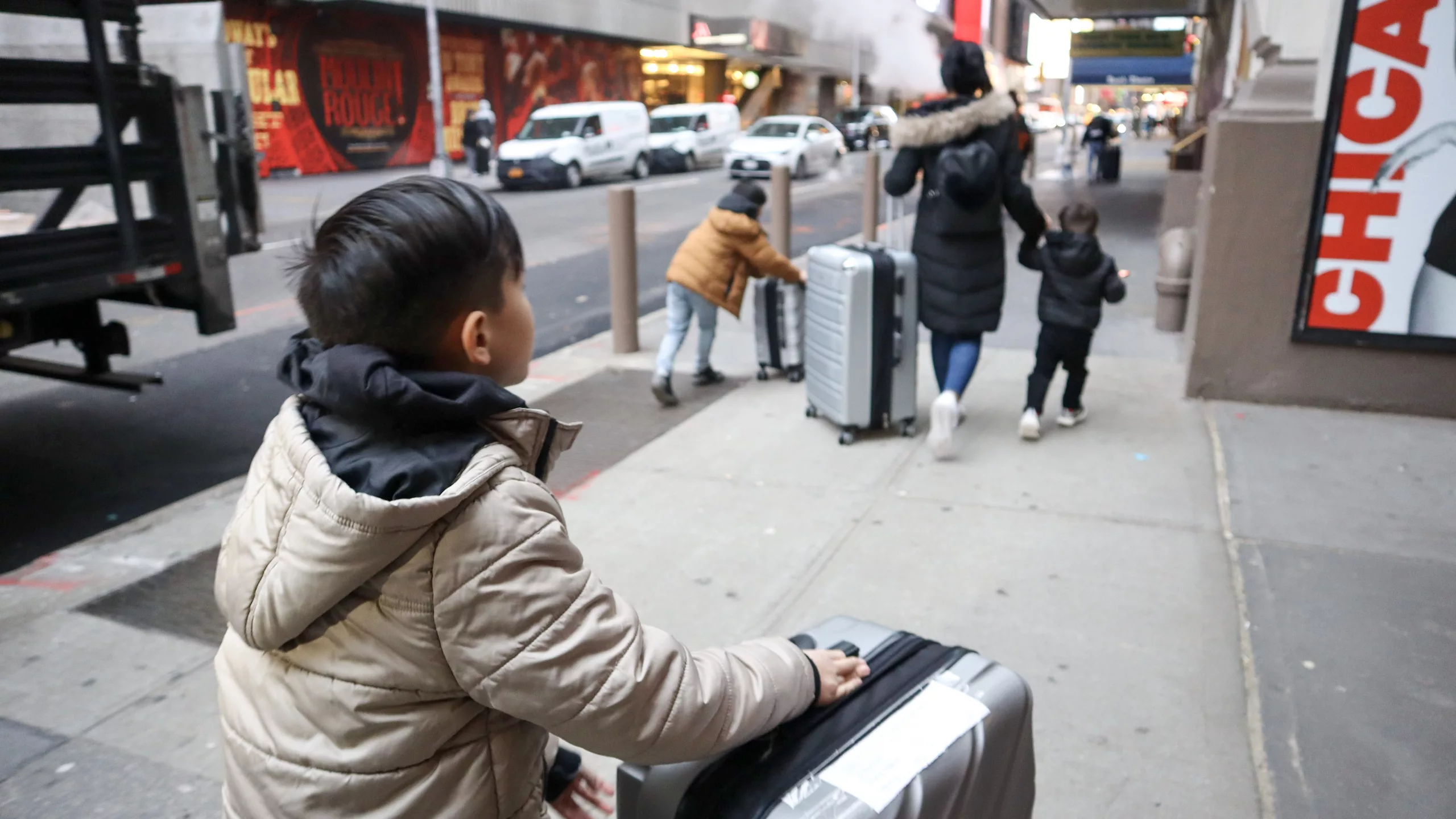
But other migrants said the conversations with the staff were helpful, and that workers checked in with them every 15 days to speak about what their housing plans looked like. Richard Gonzalez lived in the shelter for nine months with his 6-year-old son and his wife before being evicted on Tuesday. Now, the family was heading out of the state to Pennsylvania to stay in an apartment with a family member. He was grateful to the city for providing shelter to his family.
“We are from Venezuela. We adapt to everything,” Gonzalez said as he headed to the subway with his family and personal belongings. “This is nothing.”
Schooling is disrupted by 60-day notices
As their eviction dates approached, some migrant children were already missing school while their parents scrambled to find new housing and enroll them in different school districts.
Last week, 7-year-old Zhoemi Alquinga exited the Row on Thursday morning holding the hands of her mother, Maria Correa, and her three-year old brother Anders. The family, originally from Quito, Ecuador, hadn’t found housing they could afford in the city but had saved up $4,000 over the past year, just enough for a security deposit and the first month’s rent in a one-bedroom apartment in East Orange, New Jersey. They started moving into their apartment before their eviction date this week.
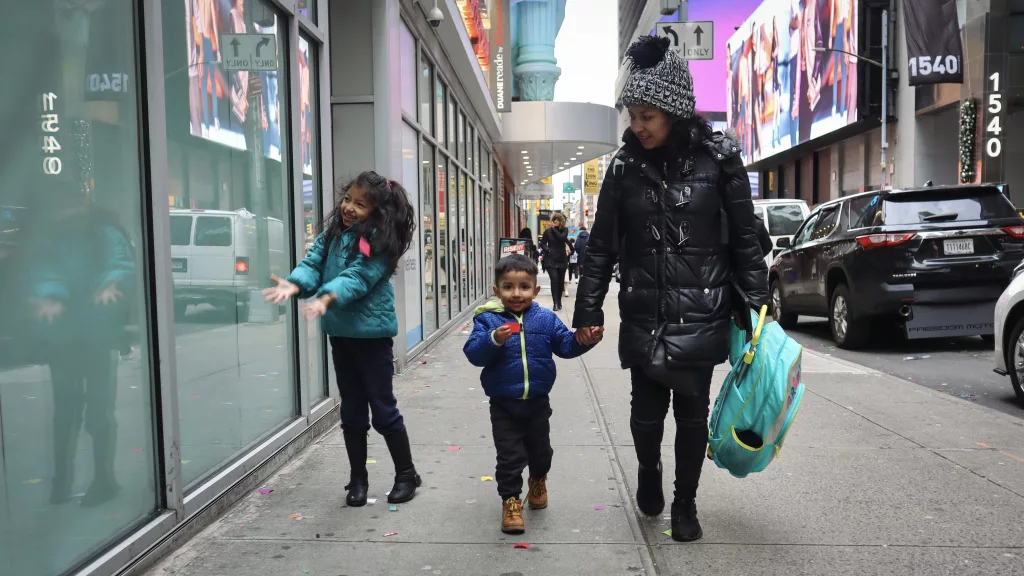
Zhoemi has now missed more than a week of school in between moves and enrollment challenges in the middle of the school year. When her mother, Correa, tried to sign her up for classes in New Jersey, she was told that she would have to submit multiple proofs of address and other documents, which she did not yet have and did not know how to obtain. And the district was unable to immediately enroll Anders in Pre-K, which leaves Zhoemi’s mother to care for Anders full time. Zhoemi’s enrollment into school in New York had been seamless, Correa said, but Zhoemi is no longer allowed to attend New York public schools if she lives in New Jersey, the family was told.
Also Read: One Year in NYC: Migrants Still Fighting to Leave Shelters
“It makes things really complicated for me,” Zhoemi’s mother, Correa, said. “We were really worried because we knew that they were going to send us out of the hotel.”
For Zhoemi and Anders, their shelter and school in Manhattan provided them with a sense of normalcy that had been lacking both in Ecuador, and during their journey to arrive in New York. Zhoemi especially had been picking up English, and liked naming the colors and counting numbers. She had been making friends she was now forced to move away from. “I’m not going to see them,” she lamented in Spanish about her friends, as she colored with crayons in her favorite colors, purple and pink, in the booth of a New York city restaurant. “She already misses them,” her mother added.
In February, Zhoemi’s mother worries that her children will be left without a place to sleep if she and her husband don’t earn the $2,000 required for rent next month. “The truth is, right now I’m at a point where I don’t know what to do,” Correa, 30, said. “We don’t even have [money] to buy groceries.”
At Monday’s rally, New York City council member Rita Joseph, who chairs the education committee, said that the stability and education of migrant children, like Zhoemi, threatens to be disrupted by the 60-day policy. “Our youngest New Yorkers, those who are here to seek a better life with their families should not be a political pawn in this administration,” Joseph said. “The children who will be kicked out are the very future of this city. They have made friends and found a sense of hope.”
“We don’t have a choice.”
As of Tuesday evening, it was unclear where the approximately 40 families evicted earlier that day would sleep. But even for some families with 60-day notices who knew they had an apartment or room to stay in, leaving their New York shelter also meant abandoning the sense of security that had been built up over months, or longer.
Last week, Correa’s children, Anders and Zhoemi, ran across the sidewalks in Times Square, picking up leftover confetti from the New Year’s ball drop. Correa took them to the Roosevelt to check if there were other options for shelter in the city, so that her children could stay in their same school. The siblings filled 45th St. with their giggles as strangers walking past flashed smiles at them. It was hard to tell from their joy all that they had endured to reach New York.
In 2022, Correa and her family trekked to the U.S. from Ecuador, where they had left due to violence and extortion. They spent several days in the Darién Gap, where Zhoemi developed sores on her feet from walking so much. Correa carried her son Anders on her back over streams and rivers. Now, he doesn’t like taking baths or being near any water at all, Correa said. “He cried, and he screamed,” she said. Correa dabbed the tears flowing down her cheeks with a napkin as she recounted the journey. “She was very brave,” Correa said, nodding to her daughter Zhoemi.
For Ntsame, the 35-year-old mother from Gabon who was evicted on Tuesday, the idea of New York had been a dream for her family. “New York is so beautiful,” she said with a wide smile on her face. Now, to leave the city she had grown to love was painful. “I am really sad,” she said as she headed to catch the bus out of New York. “But we don’t have a choice. That is life.”



